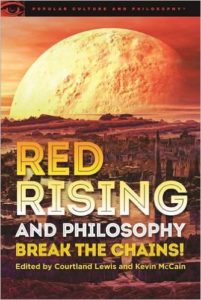
This book was reviewed for the San Francisco and Seattle Book Review
Red Rising and Philosophy is but one among several new additions to the wonderful pop culture and philosophy series. This one focuses on Pierce Brown’s Red Rising Trilogy. There are four sections, looking at various aspects of the stories, from the value and ethics of eugenics, to stratified caste cultures, to the nature of rebellion.
There are many great essays here. Some of my favourites include:
‘Not So Human After All’ looks at notions of biology and how species are defined. Species, even genetically created ones such as the Colours of Red Rising, change and evolve over time. Biology isn’t destiny, though, as Shea remarks. Darrow is prime proof of this.
‘The One, the Only, Darrow’ focuses on questions of personal identity, and what makes an individual. If a person is changed physically, such as with Darrow’s Carving, does that not in truth change his identity? Or is identity tied to psychology? To the elusive spirit? This is a question perfect for Dr Who as well!
‘Living for More’ discusses notions of the meaning of life, both in terms of ‘why do we exist’, as a whole, and ‘what makes a life meaningful’, as an individual, within the world of Red Rising.
‘Pierce’s Republic’ compares Pierce Brown’s Red Rising Trilogy to Plato’s Republic. Brown himself says that Plato’s Republic influenced him.
‘Beautiful Colours and Unjust Societies’ compares how utopias and dystopias are defined, and looks at how more subjective descriptors like notions of beauty are defined. How much is truly subjective? How much is ingrained in our communal conscious?
I love these books! They focus and sharpen philosophical concepts, revealing how they are present underlying our entertainment, and illustrating their relevance in today’s society. Pierce Brown’s Red Rising Trilogy, and Red Rising and Philosophy both really hit home for me at this time, given the strife within my own country. Stories like these, where you have a group of people who believe they have some sort of genetic and/or moral superiority over other groups of people show the egocentric nature of such thinking, as well as showing that people oppressed will eventually get to a point where they will no longer tolerate such discrimination.

